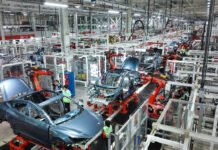Why The Indian Automobile Market Slows Down During Pitru Paksha: A Cultural Insight
Introduction: The Intersection of Culture and Commerce
INVC NEWS
Mumbai : Have you ever wondered why the bustling automobile industry in India takes a sudden backseat during a specific time of the year? The answer is intrinsically tied to Pitru Paksha, a period observed in the Hindu lunar calendar. This two-week stretch affects not only the spiritual but also the commercial aspect of life. Here’s everything you need to know about why cars and bikes take a pitstop during Pitru Paksha in India.
The Spiritual Significance of Pitru Paksha
Pitru Paksha is a sacred time in Hindu culture dedicated to paying homage to deceased ancestors. During this 15-day period, rituals like Pind Daan, charity, and Tarpan are performed to honor and provide spiritual peace to the departed souls. Any form of new beginnings, be it personal or commercial, is generally avoided. This extends to purchasing new goods, starting new ventures, or even buying a new car or bike.
Why No New Purchases: A Deeper Dive
According to traditional beliefs, buying new items during Pitru Paksha is disrespectful to the ancestors, as the focus is shifted from remembrance to worldly concerns. Some even say that the new items bought during this time could be haunted or negatively influenced by spirits. Regardless of the reasoning, the impact on the automobile market is tangible.
Pitru Paksha and the Automobile Industry
Automakers and dealerships take a noticeable hit during this 15-day period. The timing is particularly challenging because Pitru Paksha occurs just before the festive season kicks off, a typically high-sales period for the auto industry. During Pitru Paksha, you’ll find that not a single new car or bike gets delivered, making this a somewhat dormant phase for the sector.
Changing Tides: Modern Adaptations
Though tradition holds strong, there’s been a noticeable shift in consumer behavior in recent years. Some people are now opting to book their vehicles during Pitru Paksha and have them delivered immediately after the period ends. Dealerships are also starting to offer lucrative discounts during this usually slow period to entice buyers.
What Comes After: The Festival Frenzy
Once Pitru Paksha ends, India’s festive season kicks into high gear with celebrations ranging from Navratri to Christmas. Car and bike manufacturers seize this opportunity to lure in consumers with attractive offers and promotions. The pent-up demand post-Pitru Paksha also contributes to a surge in sales during the festival months.
Conclusion: Balancing Tradition and Modernity
While Pitru Paksha continues to be a period of spiritual reverence, its impact on consumer behavior and, subsequently, the auto industry, is evolving. Yet, it serves as a compelling example of how cultural beliefs can influence economic trends. As modernity inches its way into tradition, the industry is finding new ways to adapt without upsetting cultural sentiments.
Whether you’re a devout observer of Pitru Paksha or a curious onlooker, it’s hard to ignore the influence of this ancient practice on one of India’s most dynamic industries. And as the festival season revs up, it’s time to make up for the quiet lull and hit the gas pedal on new purchases.
















